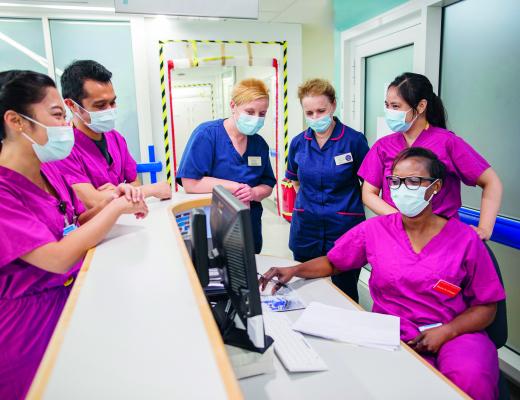
Going above and beyond
The Royal Marsden’s CCU is the largest facility of its kind in the UK – and one of the biggest in Europe – to be dedicated to cancer. The CCU is designed to help patients recover from complex surgery, and offers highly specialised one-to-one care to seriously ill patients and those with complex needs.
After a devastating fire in 2008 that damaged the original CCU, The Royal Marsden Cancer Charity raised £10 million to fund a complete refurbishment of the unit, doubling its previous capacity. Now, it has seven isolation rooms, including two teenage and young adult bays.
COVID-19 was a new experience for us all and everyone was trying to get through it together
Throughout the pandemic, CCU staff have provided round-the-clock care for critically unwell patients. The unit has been incredibly busy, with more admissions due to COVID-19 and the Cancer Surgical Hub.
Set up at the start of the pandemic, the hub enabled cancer patients from London and the southeast to access surgery at The Royal Marsden when local hospitals were overwhelmed by COVID-19. The hospital expanded the number of beds on the CCU to provide specialist care to more patients recovering from operations.
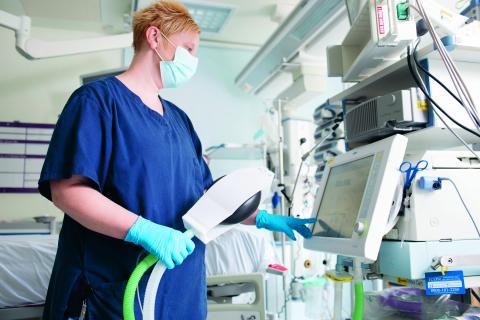
Catherine Forsythe, Practice Educator on the CCU, has a dual nursing role that combines caring for patients with taking the lead in training and supporting clinical teams on the unit to improve their professional practice. During the pandemic, she was responsible for training the team in new COVID-19 processes, ensuring that everyone was as well-equipped as possible, in addition to looking after patients.
“When COVID-19 hit, it was a new experience for us all,” she says, “and everyone was trying to get through it together.
“Our biggest challenge was mobilising the teams to quickly take on the increased numbers of patients who were being admitted to our CCU from all across London.
“Nurses from other areas of the hospital were volunteering their skills. We tailored our medical care not only around the clinical needs of our patients, but also based on their psychological needs, offering extra pastoral care. This has been important during the past year.”
The staff lifted me and got me through the rough patches. I’ll always be grateful to the staff who cared, encouraged and motivated me when I was very sick, especially during such a challenging time for them.
Meeting the psychological needs of patients and staff was a key element of The Royal Marsden Cancer Charity’s £2 million emergency COVID-19 appeal. The funds raised enabled the Staff Counselling and Psychotherapy Service to offer additional support for staff caring for patients throughout the pandemic.
“Working through the waves was tough and had a real impact on our resilience and wellbeing,” says Catherine. “Staff were stressed about keeping patients and their colleagues safe. We were having to wear PPE for very long hours.
“A lot of the team are from overseas, so emotions were high from the worry of not being able to see relatives. Having psychological support on hand was invaluable, and still is.”
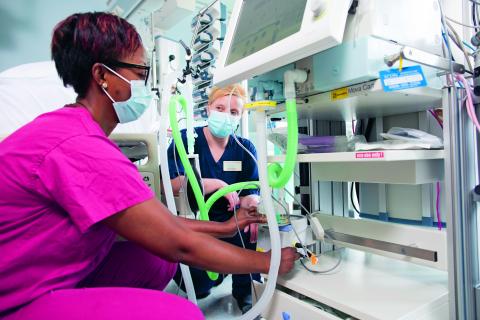
Kevin McNulty, 71, was looked after in the CCU last year. “The care and treatment I received on the CCU were exemplary. The staff lifted me and got me through the rough patches. They had to become our friends and family as well as undertaking their clinical roles. I’ll always be grateful to the staff who cared, encouraged and motivated me when I was very sick, especially during such a challenging time for them.”
“Everyone pulled together so well,” Catherine adds. “The whole experience has brought the unit closer together and I’m so proud of the team for all their efforts.”
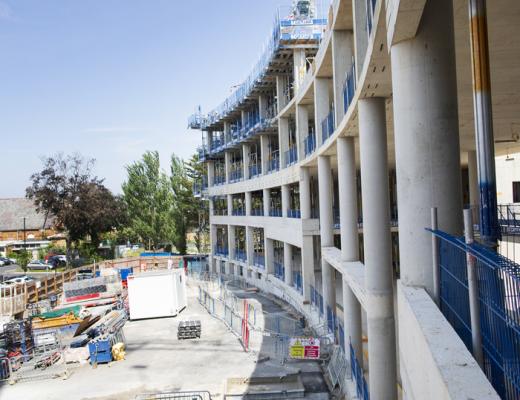
Building hope, brick by brick
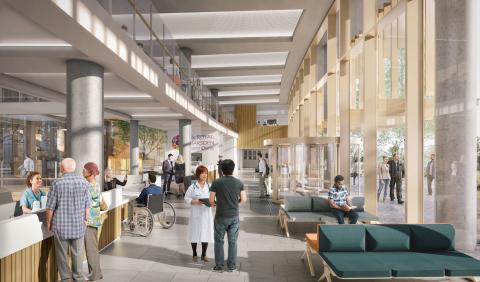
Our public appeal is now under way to raise the final few millions we need to complete the Oak Cancer Centre in Sutton – and we’re incredibly excited to see this state-of-the-art research and treatment facility take shape.
The construction team has made impressive progress: the centre has already reached the fourth storey and is on track to open in 2022.
Our dedicated supporters have been donating to the appeal and taking part in challenges to get us to our fundraising target. The Triple Challenge team recently took on the Lake District National Park by foot, bike and kayak. In October, supporters will host their own Marsden Mornings, with every cake sale or crafting session helping to raise funds. And, in 2022, a group of explorers will trek to Machu Picchu with former Olympian Iwan Thomas.
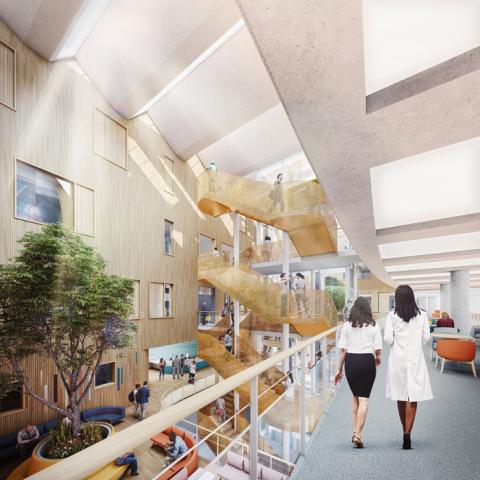
Named after our biggest-ever single donation of £25 million from Oak Foundation, the Oak Cancer Centre will revolutionise cancer research, improve patients’ experiences and help save more lives.
The centre will bring more than 400 researchers – who are currently dispersed across the Sutton site – under the same roof. Here, the Kuok Group Foundation Research Centre will encourage researchers who specialise in different cancer types to work together, sharing ideas in breakout spaces to help speed up the development of new treatments.
The new Day Care Unit will have room to allow a relative to sit with a family member or friend. Having space to have a loved one with you will make an enormous difference.
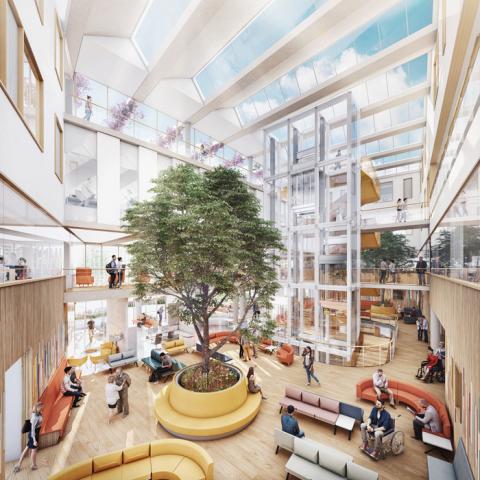
On the ground floor, outpatients will be able to have blood tests, see their consultant and collect a prescription all on the same level. In the Day Care Unit on the second floor, patients receiving chemotherapy and immunotherapy will be able to enjoy quiet, spacious, modern surroundings with natural light from the floor-to-ceiling windows.
“We know that patients find it hard when they come in for chemotherapy alone,” says Samantha Wigfall, Lead Nurse for the Oak Cancer Centre. “The new Day Care Unit will have room to allow a relative to sit with a family member or friend. Having space to have a loved one with you will make an enormous difference.”

Making Celebrate a Life extra special
Taking place every December, Celebrate a Life is our annual carol service and a time when we celebrate everyone dear to us. We held our first-ever virtual service last year as we couldn’t come together in person due to the pandemic. It was a huge success, with an incredible £112,059 raised.
I attend the carol service each year in memory of my father and brother. It means a lot to me and is my chance to thank The Royal Marsden for giving me more time with them both. I am so pleased we could still take part last year despite the restrictions.
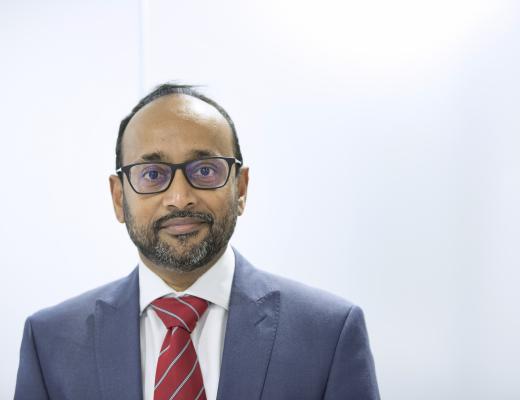
Q&A: Professor Vinidh Paleri
This is an umbrella term for cancers of the voice box, throat, lips, mouth, nose, and salivary and thyroid glands. It’s often hard to treat and aggressive, and, depending on the type and site of the cancer, between a fifth and half of cases return.
At The Royal Marsden, we have great expertise in managing head and neck cancers. IReC will harness the specialist knowledge of The Royal Marsden and The Institute of Cancer Research, London, by bringing together talented clinicians and researchers to create a global centre of excellence. Through research, it will set national and international standards in the treatment, palliation and supportive care of patients with recurrent head and neck cancer. The centre is being funded by The Royal Marsden Cancer Charity, thanks to the generous support of Charles Wilson and Dr Rowena Olegario, and Keith and Isabelle McDermott.
A national registry to develop our understanding of recurrent head and neck cancer and capture variation in how it is treated across the UK, plus a tissue biobank to help explore and validate key research findings. New research staff, including three PhD research fellows, a trial manager, a clinical trial nurse and a data manager are also being funded.
IReC will harness specialist knowledge to create a global centre of excellence
IReC data will form the basis for multicentre clinical trials which, ultimately, will lead to improved patient outcomes. We aim to explore minimally invasive surgery using the da Vinci Xi robots, and combining surgery with immunotherapy and other novel agents. We also hope to investigate the role of viral therapies and biomarkers in developing new treatments
Through the registry, biobank and leading-edge global research projects, IReC will help define standards for the treatment of recurrent head and neck cancer in the NHS and, in future, internationally.

